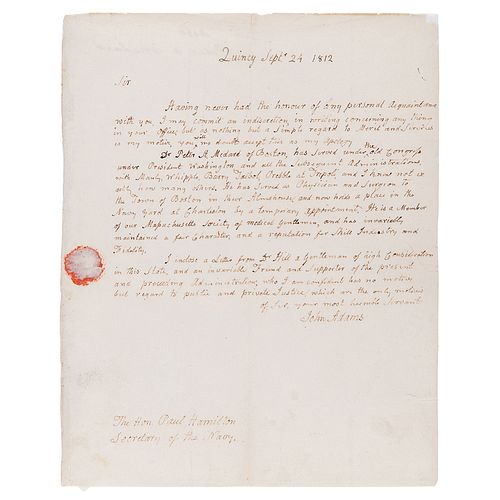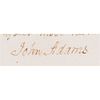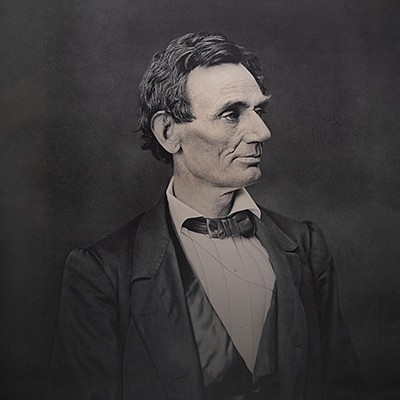John Adams Autograph Letter Signed to the Secretary of the Navy, Recommending a Naval Surgeon Who Served "Under President Washington"
Two ways to bid:
- Leave a max absentee bid and the platform will bid on your behalf up to your maximum bid during the live auction.
- Bid live during the auction and your bids will be submitted real-time to the auctioneer.
Bid Increments
| Price | Bid Increment |
|---|---|
| $0 | $5 |
| $50 | $10 |
| $200 | $25 |
| $500 | $50 |
About Auction
Feb 14, 2024
RR Auction's February Fine Autographs and Artifacts auction boasts 600 unique items, and honors Presidents' Day with a special section featuring incredible presidential autographs, artifacts, and memorabilia. RR Auction support@rrauction.com
- Lot Description
Significant ALS, one page, 7.75 x 9.75, September 24, 1812. Handwritten letter to Secretary of the Navy Paul Hamilton, written from Quincy, Massachusetts, amidst the War of 1812. In full (translated): "Having never had the honour of any personal acquaintance with you, I may commit an indiscretion, in writing concerning any thing in your offices, but as nothing but a simple regard to Merit and Services is my motive, you will no doubt accept this as my apology. Dr. Peter St. Medard of Boston, has served under the old Congress under President Washington and all the subsequent administrations, with Manly, Whipple, Barry, Talbot, Prebble at Tripoli, and I know not exactly how many others. He has served as Physician and Surgeon to the Town of Boston in their Almshouse, and now holds a place in the Navy Yard at Charleston by a temporary appointment. He is a Member of our Massachusetts Society of Medical Gentlemen, and has invariably maintained a fair character, and a reputation for Skill, Industry and Fidelity. I inclose a Letter from Dr. Hill a gentleman of high consideration in this State, and an invariable Friend and Supporter of the present and preceding administrations, who I am confident has no motive but regard to public and private Justice, which are the only motives." In fine condition, with a few tiny professional repairs.
Born in France, Dr. Peter St. Medard spent his early years on slave trading voyages from La Rochelle to Africa and the West Indies. Captured by the Royal Navy during the American Revolution, he spent time on the infamous British prison ship Jersey at New York. Released from captivity to Boston in 1778, he embraced the newly formed United States as his home and joined the Continental Navy as a surgeon. He spent his post-Revolution years in private practice in Boston.
As the Quasi-War with his native France escalated, St. Medard once again returned to service: in 1799, President John Adams commissioned him as a surgeon in the United States Navy and assigned to the newly launched frigate U.S.S. Constitution, where he served from 1799 to 1802, becoming the first surgeon to complete a full tour of duty on 'Old Ironsides.' Adams makes note of St. Medard's distinguished service, evoking the names of the important, early captains and commodores under whom he served: among them John Manley, Abraham Whipple, John Barry, Silas Talbot, and Edward Preble. In 1805, citing exhaustion from a long life at sea, St. Medard obtained an appointment at the Charlestown Navy Yard as a recruiting officer. - Shipping Info
-
Bidder is liable for shipping and handling and providing accurate information as to shipping or delivery locations and arranging for such. RR Auction is unable to combine purchases from other auctions or affiliates into one package for shipping purposes. Lots won will be shipped in a commercially reasonable time after payment in good funds for the merchandise and the shipping fees are received or credit extended, except when third-party shipment occurs. Bidder agrees that service and handling charges related to shipping items which are not pre-paid may be charged to a credit card on file with RR Auction. Successful international Bidders shall provide written shipping instructions, including specified Customs declarations, to RR Auction for any lots to be delivered outside of the United States. NOTE: Declaration value shall be the item’(s) hammer price and RR Auction shall use the correct harmonized code for the lot. Domestic Bidders on lots designated for third-party shipment must designate the common carrier, accept risk of loss, and prepay shipping costs.
-
- Buyer's Premium



 EUR
EUR CAD
CAD AUD
AUD GBP
GBP MXN
MXN HKD
HKD CNY
CNY MYR
MYR SEK
SEK SGD
SGD CHF
CHF THB
THB




